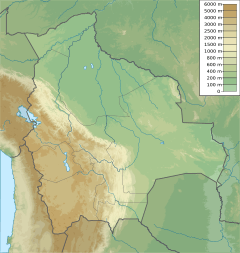Oreobates zongoensis facts for kids
Quick facts for kids Oreobates zongoensis |
|
|---|---|
| Conservation status | |
| Scientific classification |
|
| Kingdom: | Animalia |
| Phylum: | Chordata |
| Class: | Amphibia |
| Order: | Anura |
| Family: | Strabomantidae |
| Genus: | Oreobates |
| Species: |
O. zongoensis
|
| Binomial name | |
| Oreobates zongoensis (Reichle and Köhler, 1997)
|
|
| Script error: The function "autoWithCaption" does not exist. | |
| Synonyms | |
|
|
Script error: No such module "Check for conflicting parameters".
The Zongo Valley Frog (Oreobates zongoensis) is a special type of frog. It belongs to the Strabomantidae family. This frog is found only in Bolivia. Specifically, it lives in the Zongo Valley within the Pedro Domingo Murillo Province. Being "endemic" means it's unique to that one place and found nowhere else in the world.
What Does the Zongo Valley Frog Look Like?
The first Zongo Valley Frog ever studied was an adult male. It was about 29 mm (1.1 in) long from its nose to its rear end. This is about the size of a large paperclip!
Its head is a bit wider than its body. The front part of its face, called the snout, is somewhat pointed. You can clearly see a ridge between its eye and nostril, known as the canthus rostralis. The frog also has a visible eardrum, or tympanum.
The skin on its head, back (dorsum), sides, and back legs is bumpy. These bumps are called tubercles. But the skin on its front legs and belly is smooth. Its fingers and toes have small, flat pads called discs. However, they do not have webbing between them, like a duck's foot. They also lack any extra skin flaps on the sides.
The frog's head, back, and sides are a dark pinkish-brown color. They do not have any special patterns or markings. The top parts of its front legs and the back parts of its hind legs are purple to brown. Its chest and the underside of its front legs are pinkish. The belly and the underside of its hind legs are pinkish-brown. The frog's eye color is orange, with a fine, black net-like pattern called a reticulum.
Where Does the Zongo Valley Frog Live?
The Zongo Valley Frog is only known to live in the Zongo Valley in Bolivia. The very first frog found, called the holotype, was discovered during the day. It was hiding in a small space under a large stone. This area was a mountain rainforest that had been disturbed, meaning it was changed by human activity. This spot was about 1,250 m (4,100 ft) above sea level.
Sadly, the exact place where the first frog was found has been completely destroyed. This happened because a hydroelectric power plant was built there. However, there's good news! In 2016, scientists found several more of these frogs. They were discovered in a part of the Zongo Valley where the forest was still untouched and healthy. This gives hope for the future of this unique frog species.
 | May Edward Chinn |
 | Rebecca Cole |
 | Alexa Canady |
 | Dorothy Lavinia Brown |



